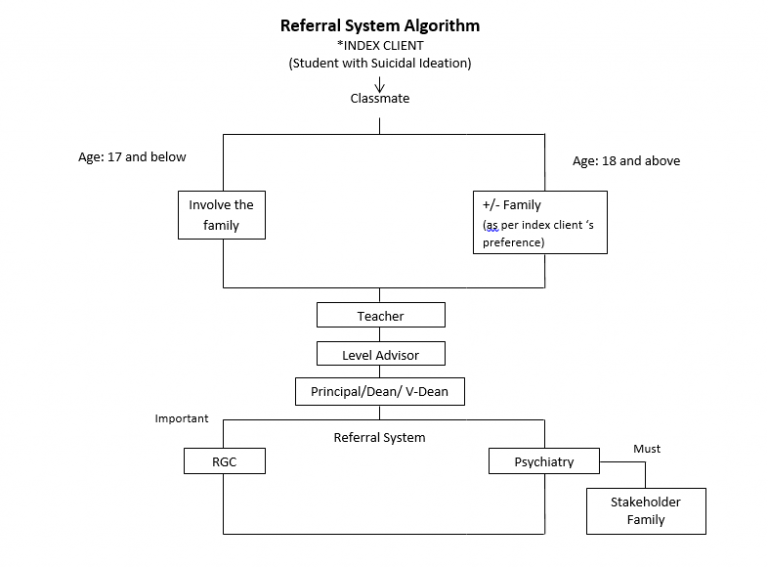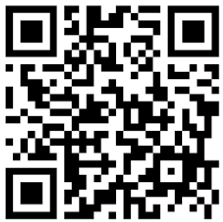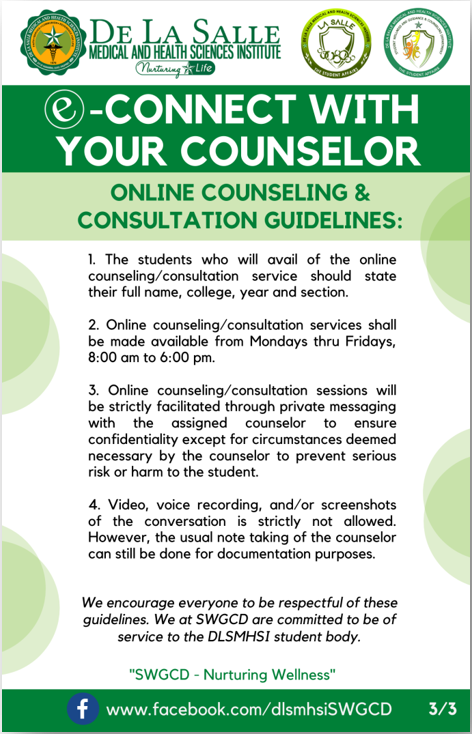
Student Wellness and Personal Enrichment Unit
OBJECTIVES
To assist students in appreciating and actualizing their skills and potentialities to the fullest by understanding and accepting their own uniqueness, strengths, limitations, vital needs and concerns.
Students
- To identify the individual needs and problems;
- To give the students a better understanding of their abilities, skills, strengths, and potentials, as well as to help compensate for their weaknesses;
- To contribute to the development of the emotional, social, psychological, and educational growth of students;
- To help them come up with the best answers to their problems, needs, and concerns, and gain better adjustment; and
- To guide, motivate, empower, and equip students to achieve their maximum educational and career potential.
Faculty and Administrator
- To establish a healthy and efficient working relationship with the school community in order to fulfill the objectives and purposes of the guidance program;
- To assist the school in developing programs to meet the specific and general needs of students;
- To give a better understanding of the students’ personality and emotional intelligence (emotions at work); and
- To assist students in addressing problems on adjustment.
Parents
To establish a helping relationship and trust between counselor and parents in understanding the underlying causes of undesirable behavior.
Major services
-
SERVICES
1. COUNSELING
Counseling is the heart of the Guidance Program. It is geared towards the establishment of rapport and a feeling of mutual trust and understanding with the students to fully assist them in the process of resolving their issues and concerns.
Objective:
- To create meaningful awareness and understanding of the self and environment, improving planning and decision making, and formulating new ways of behaving, feeling and thinking for problem resolution and/or development growth.
Services:
a. Voluntary/ Walk-in Counseling (A student seeking the help of the counselor voluntarily)
- Counseling session focuses on helping the student overcome pressing needs, difficulties and problems, thereby enabling them to make appropriate actions and make necessary adjustments.
b. Individual Academic Counseling
- A means of correlating an individual student’s psychological test results with his/her General Weighted Average (GWA), aimed at fostering self-understanding in relation to academics.
c. Follow-up Counseling based on the Individual Student’s Annual Interview who sought Voluntary Counseling
- A counseling process that determines or assesses the condition and progress of the student’s concerns or issues.
d. Career Counseling
- Assists students in dealing with difficulties and adjustment problems related to their chosen career field. It also helps them make informed decisions about future specializations and further education, considering key factors such as personality, values, skills, and competencies.
e. Family Counseling (as the need arises)
- Helps family members improve communication, strengthen the support system, and resolve conflicts.
2. INTERVIEW (Annual individual interviews with students)
This establishes rapport and to assess pressing situations as preventive measures or interventions/counseling.
Types/kinds of interview:
- Initial – First Year
- Routine – Second Year
- Follow up – Third year
- Exit – Fourth year / Fifth Year
3. REFERRAL SERVICE (as need arises)
This establishes and strengthens a helping relationship with parents and teachers in order to promote the holistic welfare and self-actualization of students. As the need arises, family counseling, home visits, and telephone counseling may be conducted.
4. PSYCHOLOGICAL TESTING
This provides important information that fosters self-awareness and acceptance of one’s strengths and limitations. It is geared toward prediction, counseling, assessment, and evaluation, as well as preparing students for their future careers. The administration, scoring, and individual narrative interpretation of psychological tests are conducted by a credible testing agency.
Objectives:
- To help students discover and accept their strengths, limitations, and potentials to facilitate better self-understanding and adjustment to various life situations;
- To help the counselor gain a better understanding of the individual;
- To help students set their educational goals;
- To identify students’ concerns, difficulties, and problems, as well as their psycho-emotional needs;
- To serve as a springboard for counseling;
- To help counselees arrive at decisions when planning their educational and vocational futures; and
- To provide data for research and studies.
5. PARENT CONFERENCES – Parent Conference/Consultation (as need arises)
This establishes relationships with parents in order to promote holistic welfare and development of their children.
6. TEACHER CONFERENCES – Teacher Conference/Consultation (as need arises)
- This strengthens helping relationship with teachers by:
- Involving them in scheduling and implementation of guidance activities; and
- Updating the concerned faculty on the progress of the student’s problem, taking into consideration the ethics/principles of confidentiality.
7. INFORMATION
- It provides important information to students that promotes attitudes and habits which assist them in making intelligent choices and decisions, and in coping with life’s complexities.
Objectives:
- To provide students with the latest career and occupational information;
- To ascertain students’ career choices and assist them in choosing a field of specialization;
- To help students build a better perspective in life;
- To inform students of the latest trends and technologies in their chosen course;
- To provide data for research and studies;
- To make the faculty aware of the following reports:
- College/Year Level Profile of Students’ Common Needs and Problems
- Psychological Test Results
- These are disseminated and discussed with students, faculty, and administrators; and
To make the faculty aware of the various Guidance Services available.
Services:
- Guidance orientation for students and faculty;
- Career and occupational information posted on the College Guidance bulletin board; and
- Summary reports on the College/Year Level Profile of Students’ Needs Assessment Checklist and Psychological Test Results, which are disseminated and discussed with students, faculty, and administrators.
8. RESEARCH AND EVALUATION
- Research on Career, “Assessing the Students’ Preparedness for Future Profession”, considering the paradigm shift towards Asian trend in career.
- Reports on students’ psychological test results, counselors’ evaluations by students, and common needs and problems are consolidated, tallied, profiled, and summarized. This process gathers pertinent data that aid the Guidance and Counseling Services Unit (GCSU) in delivering quality services and providing substantial information to the concerned members of the Institution.
Services:
- Reports on the Students’ Psychological Test Results, Need Assessment Checklists and Survey Questionnaires are summarized and profiled; and
- Guidance Service Evaluation
9. INDIVIDUAL INVENTORY
- The accumulation of records containing all pertinent information about each student is maintained and updated yearly to assist them, especially in areas where they have specific needs and concerns.
- The Student’s Personal Cumulative Record (SPCR) and Needs Assessment Checklist (NAC) are accomplished by students and serve as a springboard for counseling.
Objectives:
- To provide complete information about the students that will help the counselor better understand each individual’s situation;
- To gather reliable data about the students to support their healthy growth and development; and
- To provide data for research and studies.
Services:
- Completing, Filing and Updating:
a. Student’s Personal and Cumulative Record (SPCR)
b. Needs Assessment Checklist (NAC)
10. GUIDANCE ENRICHMENT PROGRAM (given yearly per level depending on the needs of students)
It is a developmental approach delivered through seminar-workshops to help students adjust and excel in their academics. Likewise, it equips them with knowledge and understanding of their chosen course or future career, values, psychosocial skills, and emotional intelligence. These elements are indispensable in making our graduates globally competitive, leading them to the best employment opportunities, informed decisions, and ultimately, a fulfilling and rewarding career or profession.
MENTAL HEALTH AWARENESS SEMINAR
- To promote adequate awareness and understanding of mental health issues;
- To identify signs, symptoms, and common causes of psycho-emotional concerns;
- To encourage students to speak up and seek help if they are experiencing psycho-emotional problems;
- To recommend effective self-help strategies and approaches that individuals in crisis can use to become more functional;
- To help students understand the role of a “support system: in assisting individuals in crisis; and
- To reduce the stigma associated with mental health problems.
COPING IN COLLEGE LIFE
Study Habits
- To inspire students to develop good study habits that will help improve their academic performance; and
- To get firsthand tips from alumni board top-notchers on the study habits and techniques that helped them excel academically and in board examinations.
Time Management
- To provide students with tips on how to manage and maximize their time through proper prioritization.
Stress Management
- To provide students with strategies and skills to cope with stress, especially during internship; and
- To help students develop effective stress management skills so they can perform to their fullest potential.
WORKSHOP ON STRENGTHENING THE EMOTIONAL QUOTIENT IN THE HEALTH ALLIED PROFESSION
- To learn and understand the importance of emotional quotient (EQ) in achieving success in life and in one’s career/profession;
- To evaluate one's own EQ, which includes self-awareness, self-management, social awareness, relationship management, and empathy; and
- To improve emotional intelligence and decision-making abilities, and to manage one’s emotions by developing key skills for coping with overwhelming stress.
CAREER AWARENESS
- To give the students a better understanding, realistic expectations and proper mindset about their course and the responsibilities it entails as a career/profession; and
- To help students understand the challenges they may encounter during the process of earning their degree and in their future careers.
CAREER TALK/CAREER OPTIONS
- To raise awareness of the different career options and fields of specialization;
- To help students reflect on the competencies, personality types, values, and attitudes they should consider when choosing a future career or specialization;
- To inspire students through the real-life experiences of successful professionals in the field; and
- To keep students informed about local and international trends in the medical field/chosen career or specialization.
SEMINAR ON PERSONAL and WORK VALUES (Preparing students for the world of work)
- To assist students in identifying and internalizing desirable work values as a foundation for career success; and
- To foster enthusiasm and commitment to excellence in their work, with a heart to go beyond the call of duty.
SEMINAR ON PUBLIC SPEAKING (Enhancing confidence in public speaking)
- To help students enhance their public speaking skills and boost their confidence in addressing an audience.
CURRICULUM VITAE MAKING AND WINNING INTERVIEW
- To assist graduating students in creating a comprehensive and impressive curriculum vitae, and to prepare them for a winning job interview.

-
SERVICES
11. PEER FACILITATORS GROUP
The Peer Facilitators Group is an evidence-based practice in Guidance and Counseling. It serves as a “Student Wellness Advocates Group” under the supervision of SWGCD. Passionate and interested members undergo training, seminars, and sessions to effectively fulfill their roles and understand their limitations.
Objective:
- The Peer Facilitators Group aims to reach out to more students and encourage involvement in mental health awareness and prevention activities. It also seeks to provide an avenue for students to express their thoughts, feelings, and concerns in a less threatening and more supportive environment.
MINOR Service
The minor services provided by the department include, but are not limited to:
- As needed, family counseling, home visits, and telephone counseling are provided as part of the referral service;
- An Institutional Enrichment Seminar focusing on psychosocial and psycho-emotional development is conducted during the Lasallian Days Celebration;
- Counseling services are extended to DLSMHSI employees and their relatives upon request; and
- Counselors organize outreach programs to support victims of calamities.
GUIDANCE COUNSELORS
| Guidance Counselor | Email Address | Department / College | Local Number and Office Address |
|---|---|---|---|
| DR. VIRGIMIN R. PANGANIBAN, LPT, RGC | vrpanganiban@dlsmhsi.edu.ph | College of Rehabilitation Sciences (CRS) | Local 1588 / 2nd Floor, Room 2217, Admin & Finance Center |
| DR. ERLENE C. UMALI, LPT, RGC, CMHFR | ecumali@dlsmhsi.edu.ph | Special Health Sciences Senior High School (SHSSHS) | Local 1518 / GF, Senior High School Building |
| MARIA LIGAYA D. LOPZ, MAED, RGC, CFRA, CMHA, CMHFR | mdlopez@dlsmhsi.edu.ph | Special Health Sciences Senior High School (SHSSHS) | Local 1518 / GF, Senior High School Building |
| CESAR M. LAGO, MAED, RGC, CMHA, CMHFR | cmlago@dlsmhsi.edu.ph | College of Medicine (CM) | Local 1330 / Counseling Room 1, 2nd Floor, CM Building |
| JEZREEL C. DEL ESPIRITU SANTO, MAED, LPT, RPM, RGC | jcdelespiritusanto@dlsmhsi.edu.ph | College of Medicine (CM) | Local 1330 / Counseling Room 2, 2nd Floor, CM Building |
| MIA MAILA P. MANGOBA, LPT, MAED, RGC, CMHA, CMHFR | mpmangoba@dlsmhsi.edu.ph | College of Medical Laboratory Science (CMLS) | Local 1427 / LEC Bldg. Room 5312 (3rd floor) |
| CHRISTIAN HOWELL L. GEREZ, MAED, RPM, RGC | clgerez@dlsmhsi.edu.ph | College of Medical Laboratory Science (CMLS) | Local 1427 / LEC Bldg. Room 5313 (3rd floor) |
| MA. SHEILA Q. RICALDE, MAED, RPM, RGC, CMHA, CMHFR | mqricalde@dlsmhsi.edu.ph | Dr. Mariano Que College of Pharmacy (DMQCP) / College of Dentistry (CD) | Local 1448 / Room 402, 4th Floor, DMQCP Building |
| JOSE ROYCE P. ALEDIA, RGC, CMHA, CMHFR | jpaledia@dlsmhsi.edu.ph | College of Medical Imaging and Therapy (CMIT) | Local 1438 / Room 8203, 2nd Floor, Wang Building |
| MARY GILIANNE R. PERALTA, RGC | mrperalta@dlsmhsi.edu.ph | College of Medical Imaging and Therapy (CMIT) | Local 1325 / Room 8203, 2nd Floor Wang Building |
| MAXIMO G. ESLETA, MAED, LPT, RGC, CMHFR | mgesleta@dlsmhsi.edu.ph | College of Nursing (CN) | Local 1398 / Prayer Room, Wang Building, 4th Floor |
| CHRISTINA LIZA I. LABUAC, MAED, RGC, LPT | cilabuac@dlsmhsi.edu.ph | College of Nursing (CN) | Local 1589 / Room 2218, Admin & Finance Center |
| ALLAN M. ROSADA, MAED, RGC | amrosarda@dlsmhsi.edu.ph | College of Rehabilitation Sciences (CRS) | Local 1588 / Room 2216, Admin & Finance Center |
| HANNAH MARJORIE A. ANGCAO, MAC, RGC, LPT | haangcao@dlsmhsi.edu.ph | College of Allied Sciences (CAS)/ College of Rehabilitation Sciences (CRS) | Local 1438 / Room 5112, Lourdes E. Campos |
Contact Us
Student Wellness and Personal Enrichment Unit
CLIENT FEEDBACK

Scan the QR Code or
click here
CLIENT FEEDBACK

Scan the QR Code or click here
Trunkline:
+63 (2) 8988-3100
(Manila) or
+63 (46) 481-8000 (Cavite)
Local no.: 1438
PHONE
ADDRESS
De La Salle Medical and Health Sciences Institute
Governor D. Mangubat Avenue, Zone IV,
City of Dasmariñas, Cavite, Philippines
operating hours
7:00 AM - 6:00 PM
CLIENT FEEDBACK

Scan the QR Code or
click here
CLIENT FEEDBACK

Scan the QR Code or click here
Trunkline:
+63 (2) 8988-3100
(Manila) or
+63 (46) 481-8000 (Cavite)
Local no.: 1512
PHONE
ADDRESS
Second Floor, De La Salle Animo Center
De La Salle Medical and Health Sciences Institute
Governor D. Mangubat Avenue, Zone IV,
City of Dasmariñas, Cavite, Philippines


